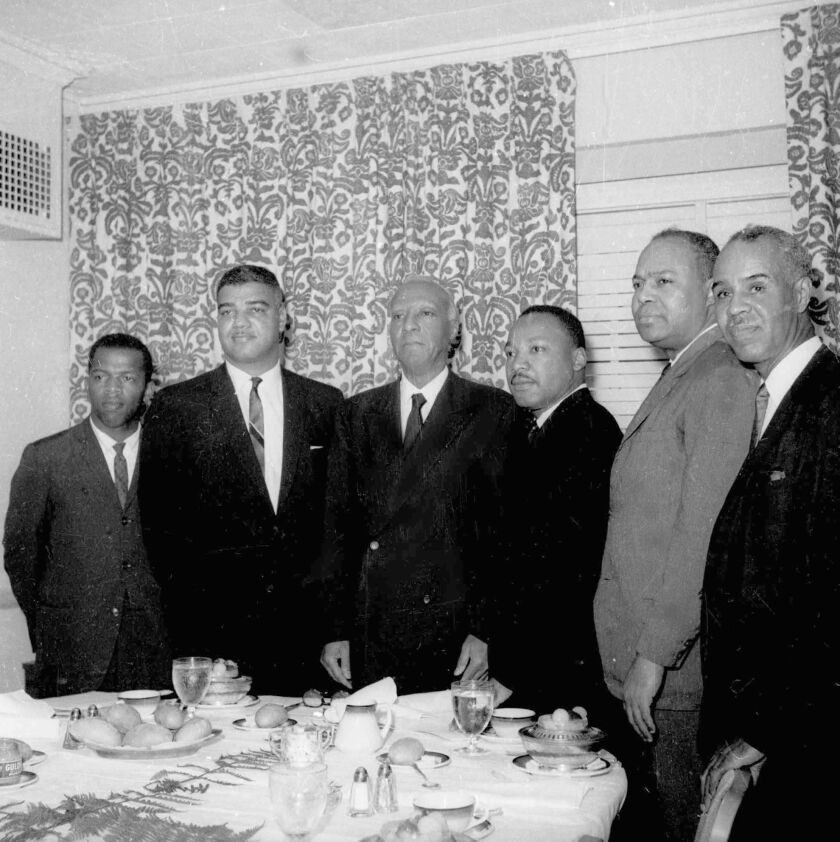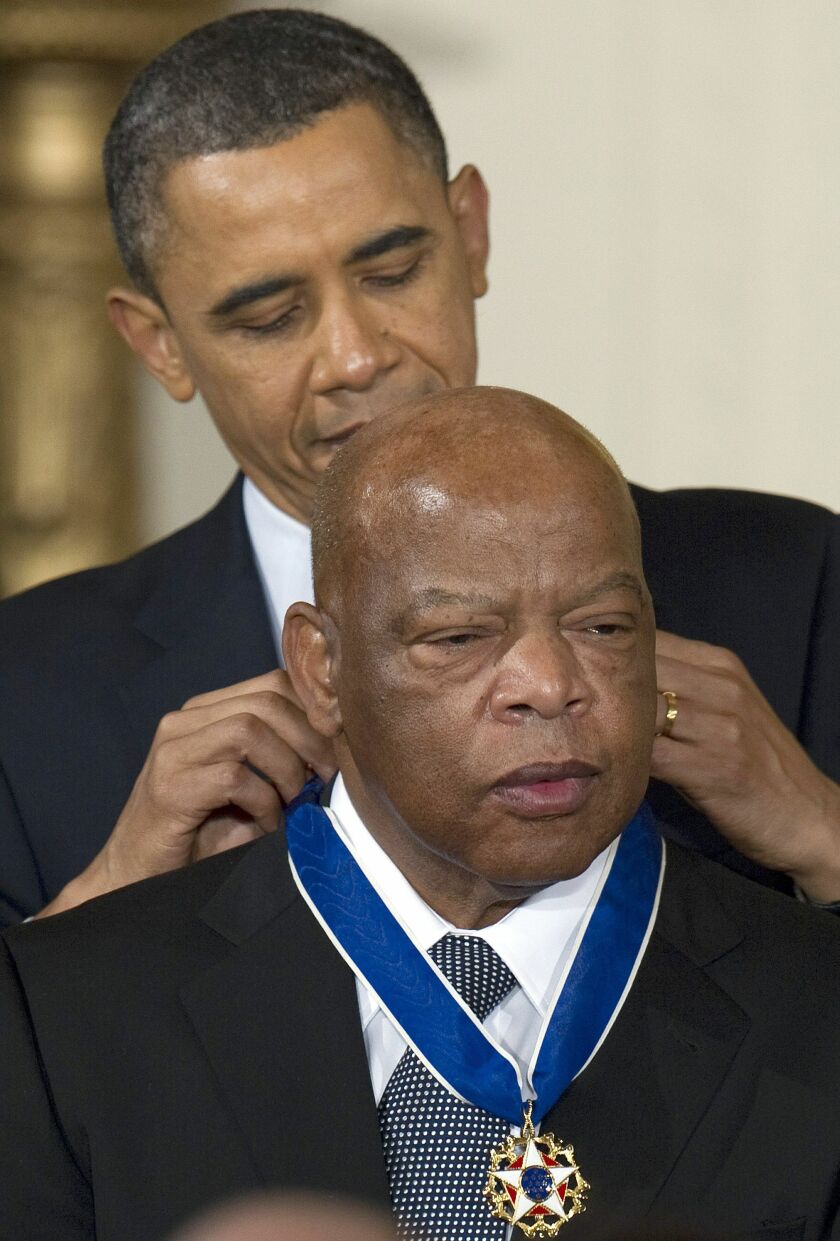ATLANTA — John Lewis, a lion of the civil rights movement whose bloody beating by Alabama state troopers in 1965 helped galvanize opposition to racial segregation, and who went on to a long and celebrated career in Congress, has died. He was 80.
House Speaker Nancy Pelosi confirmed Lewis’ passing late Friday night, calling him “one of the greatest heroes of American history” and “a titan of the civil rights movement whose goodness, faith and bravery transformed our nation.”
She added: “In the Congress, John Lewis was revered and beloved on both sides of the aisle and both sides of the Capitol. All of us were humbled to call Congressman Lewis a colleague, and are heartbroken by his passing. May his memory be an inspiration that moves us all to, in the face of injustice, make ‘good trouble, necessary trouble.’
Lewis’s announcement in late December 2019 that he had been diagnosed with advanced pancreatic cancer — “I have never faced a fight quite like the one I have now,” he said — inspired tributes from both sides of the aisle, and an unstated accord that the likely passing of this Atlanta Democrat would represent the end of an era.
Lewis was the youngest and last survivor of the Big Six civil rights activists, a group led by the Rev. Martin Luther King Jr., that had the greatest impact on the movement. He was best known for leading some 600 protesters in the Bloody Sunday march across the Edmund Pettus Bridge in Selma.
At age 25 — walking at the head of the march with his hands tucked in the pockets of his tan overcoat — Lewis was knocked to the ground and beaten by police. His skull was fractured, and nationally televised images of the brutality forced the country’s attention on racial oppression in the South.
Within days, King led more marches in the state, and President Lyndon Johnson soon was pressing Congress to pass the Voting Rights Act. The bill became law later that year, removing barriers that had barred Blacks from voting.
“John is an American hero who helped lead a movement and risked his life for our most fundamental rights; he bears scars that attest to his indefatigable spirit and persistence,” House Majority Leader Steny Hoyer said after Lewis announced his cancer diagnosis.
Lewis joined King and four other civil rights leaders in organizing the 1963 March on Washington. He spoke to the vast crowd just before King delivered his epochal “I Have a Dream” speech.
A 23-year-old firebrand, Lewis toned down his intended remarks at the insistence of others, dropping a reference to a “scorched earth” march through the South and scaling back criticisms of President John Kennedy. It was a potent speech nonetheless, in which he vowed: “By the forces of our demands, our determination and our numbers, we shall splinter the segregated South into a thousand pieces and put them together in an image of God and democracy.”
It was almost immediately, and forever, overshadowed by the words of King, the man who had inspired him to activism.
Lewis was born on Feb. 21, 1940, outside the town of Troy, in Pike County, Alabama. He grew up on his family’s farm and attended segregated public schools.
As a boy, he wanted to be a minister, and practiced his oratory on the family chickens. Denied a library card because of the color of his skin, he became an avid reader, and could cite obscure historical dates and details even in his later years. He was a teenager when he first heard King preaching on the radio. They met when Lewis was seeking support to become the first Black student at Alabama’s segregated Troy State University.
He ultimately attended the American Baptist Theological Seminary and Fisk University in Nashville, Tennessee. He began organizing sit-in demonstrations at whites-only lunch counters and volunteering as a Freedom Rider, enduring beatings and arrests while traveling around the South to challenge segregation.

John Lewis (far left) in 1963. Lewis was at the time chairman Student Non-Violence Coordinating Committee. With him are (from left); Whitney Young, national director, Urban League; A. Philip Randolph, president of the Negro American Labor Council; Martin Luther King Jr., president Southern Christian Leadership Conference; James Farmer, Congress of Racial Equality director; and Roy Wilkins, executive secretary, NAACP.
AP
Lewis helped found the Student Nonviolent Coordinating Committee and was named its chairman in 1963, making him one of the Big Six at a tender age. The others, in addition to King, were Whitney Young of the National Urban League; A. Philip Randolph of the Negro American Labor Council; James L. Farmer Jr., of the Congress of Racial Equality; and Roy Wilkins of the NAACP. All six met at the Roosevelt Hotel in New York to plan and announce the March on Washington.
The huge demonstration galvanized the movement, but success didn’t come quickly. After extensive training in nonviolent protest, Lewis and the Rev. Hosea Williams led demonstrators on a planned march of more than 50 miles from Selma to Montgomery, Alabama’s capital, on March 7, 1965. A phalanx of police blocked their exit from the Selma bridge.
Authorities shoved, then swung their truncheons, fired tear gas and charged on horseback, sending many to the hospital and horrifying much of the nation. King returned with thousands, completing the march to Montgomery before the end of the month.
Lewis turned to politics in 1981, when he was elected to the Atlanta City Council.
He won his seat in Congress in 1986 and spent much of his career in the minority. After Democrats won control of the House in 2006, Lewis became his party’s senior deputy whip, a behind-the-scenes leadership post in which he helped keep the party unified.
In an early setback for Barack Obama’s 2008 Democratic primary campaign, Lewis endorsed Hillary Rodham Clinton for the nomination. Lewis switched when it became clear Obama had overwhelming Black support. Obama later honored Lewis with the Presidential Medal of Freedom, and they marched hand in hand in Selma on the 50th anniversary of the Bloody Sunday attack.
In a statement, Clinton and her husband, former President Bill Clinton, said: “We have lost a giant. John Lewis gave all he had to redeem America’s unmet promise of equality and justice for all, and to create a place for us to build a more perfect union together.
“From a small farm in Alabama, to life-risking service in the civil rights movement, to three decades in Congress, he was always “walking with the wind,” steered by a moral compass that told him when to make good trouble and when to heal troubled waters. Always true to his word, his faith, and his principles, John Lewis became the conscience of the nation.”
Obama, who first met Lewis when he was in law school, said in a statement, “We will miss him dearly. It’s fitting that the last time John and I shared a public forum was at a virtual town hall with a gathering of young activists who were helping to lead this summer’s demonstrations in the wake of George Floyd’s death.
“Afterwards, I spoke to him privately, and he could not have been prouder of their efforts – of a new generation standing up for freedom and equality, a new generation intent on voting and protecting the right to vote, a new generation running for political office. I told him that all those young people – of every race, from every background and gender and sexual orientation – they were his children.
“They had learned from his example, even if they didn’t know it. They had understood through him what American citizenship requires, even if they had heard of his courage only through history books. Not many of us get to live to see our own legacy play out in such a meaningful, remarkable way. John Lewis did. And thanks to him, we now all have our marching orders – to keep believing in the possibility of remaking this country we love until it lives up to its full promise,” Obama said.
U.S. Rep. Bobby Rush, D-Ill., called Lewis “a superb man and incalculable contributor to the history of our nation. A man who rose from humble beginnings to become an American icon.
“We will certainly miss his trumpeting voice, calling our nation to higher heights and a greater estimation of ourselves, as a freedom loving, God fearing people.”
Lewis also worked for 15 years to gain approval for the Smithsonian’s National Museum of African American History and Culture. Humble and unfailingly friendly, Lewis was revered on Capitol Hill — but as one of the most liberal members of Congress, he often lost policy battles, from his effort to stop the Iraq War to his defense of young immigrants.
He met bipartisan success in Congress in 2006 when he led efforts to renew the Voting Rights Act, but the Supreme Court later invalidated much of the law, and it became once again what it was in his youth, a work in progress. Later, when the presidency of Donald Trump challenged his civil rights legacy, Lewis made no effort to hide his pain.
Lewis refused to attend Trump’s inauguration, saying he didn’t consider him a “legitimate president” because Russians had conspired to get him elected. When Trump later complained about immigrants from “s---hole countries,” Lewis declared, “I think he is a racist ... we have to try to stand up and speak up and not try to sweep it under the rug.”
Lewis said he’d been arrested 40 times in the 1960s, five more as a congressman. At 78, he told a rally he’d do it again to help reunite immigrant families separated by the Trump administration.
“There cannot be any peace in America until these young children are returned to their parents and set all of our people free,” Lewis said in June, recalling the “good trouble” he got into protesting segregation as a young man.
“If we fail to do it, history will not be kind to us,” he shouted. “I will go to the border. I’ll get arrested again. If necessary, I’m prepared to go to jail.”
In a speech the day of the House impeachment vote of Trump, Lewis explained the importance of that vote.
“When you see something that is not right, not just, not fair, you have a moral obligation to say something, to do something. Our children and their children will ask us ‘what did you do? what did you say?” While the vote would be hard for some, he said: “We have a mission and a mandate to be on the right side of history.”
Lewis’ wife of four decades, Lillian Miles, died in 2012. They had one son, John Miles Lewis.
Contributing: Lynn Sweet, Associated Press writer Michael Warren.







